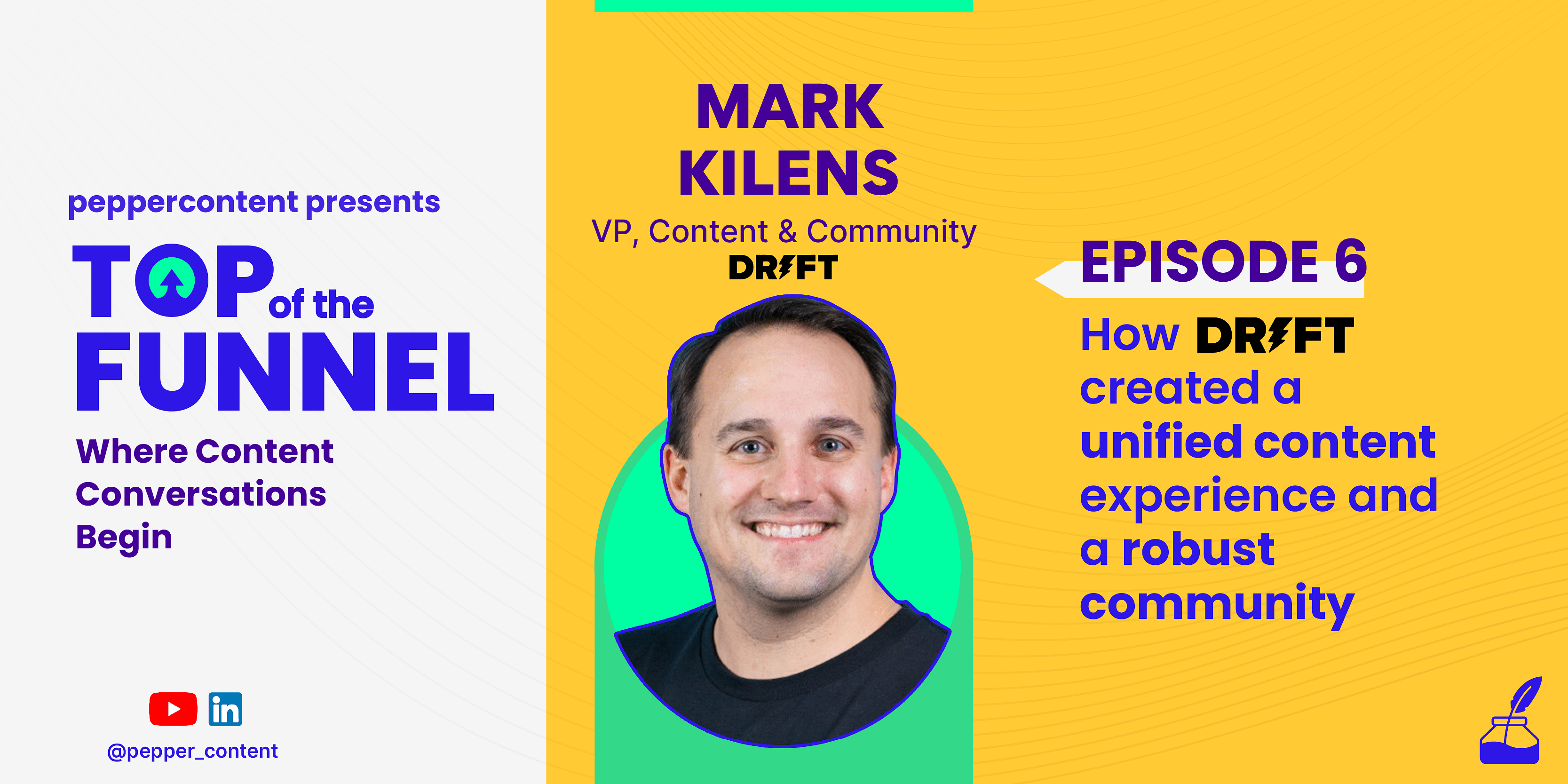When you think “content marketing”, what are the names of some brands that come to mind? A few international brands that have defined the trajectory of content marketing in the past decade or so have been the B2B SaaS giant HubSpot, and more recently, the conversational marketing platform Drift, launched in 2014.
In this latest episode of Pepper Content’s Top of the Funnel series, we have someone who has been at the forefront of both these entities.
Mark Kilens is the VP of Content and Community at Drift, and was at HubSpot for over 8 years, where he played a vital role in establishing the HubSpot Academy.
This week, Natasha Puri, Content Marketing Lead at Pepper, unravels the secret sauce of content marketing with Mark Kilens.
Watch the video here:
The evolution of content marketing
“I think content is something that has been a passion of mine for a long time, but I really didn’t realise that until I joined my first company out of school. It was a small startup back in 2008-2009. And at that company, we used HubSpot. We were one of the first a thousand businesses to use HubSpot,” says Mark.
This is how Mark’s tryst with content marketing began. He eventually went on to join HubSpot as an inbound marketer and stayed for eight years. Content marketing as a discipline evolved just as his career did.
“Content marketing has matured a lot since then. And now it’s really about creating a media-centric type of culture. It’s not just about the content. It’s about the experiences that surround that content.”
‘A unified content experience’ is a phrase that came up several times in our conversation and Mark believes that this truly is what defines content marketing today. The focus has shifted from content creation as a standalone process to content being seen as a vehicle to move prospects through their buying process to create a fan, to turn that fan into a customer, to turn that customer into a super fan.
Additionally, he also talks about content enabling product companies to deliver on their sales promises by educating and handholding the customer. And finally, he highlights the need for context: content created in a way that is going to be for the right person at the right time.
The intersection of content and community
How do content and community come together? Mark speaks about Drift Insider, the community that Drift has been working hard to create and how content is at the centre of it all. It spans across all of Drift’s content – the blog, ebooks, classes, and certifications. This content plus other exclusive benefits is what a Drift Insider member gets access to.
“So using Drift Insider as a way to personalise their Drift experience, to create a deeper connection with them, to help them feel like they belong even more. So your content in many ways is setting these expectations. I think it’s a disservice to think of your community as just a messaging forum.”
Building the HubSpot academy
The HubSpot academy as we know it today is a worldwide free online training for inbound marketing, sales, and customer service professionals. But back in 2012, when Mark started experimenting with the idea of having an academy, his motivation was that he had felt – as a HubSpot customer – that there was a dearth of educational resources around inbound marketing and of course, and the product (HubSpot’s offerings ) in general.
“When you have a product that’s more transformational in nature, you’re trying to have someone change behaviours, change habits, that requires that person to spend a significant amount of time understanding, and then actually doing it on a week-to-week basis,” Mark felt this is the core idea why the academy has worked as well as it has.
Too many courses, too little time?
In this post-pandemic world where every brand and individual is creating online courses, will entities like HubSpot academy or Drift Insider still say relevant?
Mark says yes. Provided it doesn’t end there. Online education has to be backed by a community approach and give the customer or prospect a feeling of belonging where you are providing an experience to go along with stellar content.
The questions to ask are: “How are you bringing people together to learn from one another? What makes that experience unique? How could you be more specific in what you’re teaching? Can you not be so horizontal in what you teach, but be more vertical in what you teach?”
The future of content marketing
The intersection of content and community is the future of content marketing. “It has to be two-way, not one way.” The future looks at brands fulfilling the promise of personalising the content experience for its customers, to engage with them and guide them.
Another idea Kilens is very bullish on is the role of artificial intelligence in content marketing.
“Content marketing is fundamentally changed because of AI. It’s not going to so much help on the creation side. It will a little bit, but it’s going to help more on the: how do we get the right content to the right people at the right time, how do we measure its efficacy, how can we be smarter in creating content and, how can we get more out of the tools as content marketers, and get closer to the customer.”





![Read more about the article [Funding Galore] Over $396 Mn Raised By Indian Startups This Week](https://blog.digitalsevaa.com/wp-content/uploads/2022/05/FG_Social-300x157.jpg)
![Read more about the article [Funding alert] Rockstud Capital invests in AI-driven content assistant Instoried](https://blog.digitalsevaa.com/wp-content/uploads/2021/03/Imagetgij-1605597442266-300x150.jpg)



